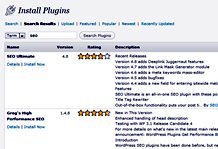Author Archive
Friday, April 22nd, 2011
Search engines take into consideration a large number of factors when assigning a rank to a website. Although there are a number of factors that are obvious or specifically identified as ranking factors, the majority of the ranking criteria are kept private. Search engines avoid publicizing the exact pieces of the Search Engine Optimization puzzle that they use to determine a rank because it would most likely lead to a massive overflow of irrelevant search results.
Search Engines recognize that if all the sites on the Internet knew the characteristics that they use, then every site would be able to rank higher. Providing this information would make it too easy for website and go against their main goal which is to provide users with the most relevant and useful search results. Clearly expressing the measurements that are used to rank a website would prevent a relevant site from standing out amongst the other results and could potentially place a higher rank on a page that is worst or is less relevant to a user.

Search Engines use both on-the page as well as off-page elements to assign a rank. On-page factors usually focus on internal site structure including keyword use and internal linking where as an off-page aspect considers who you link to, how you link to them, and the popularity or relevance of your links. Some of the factors that are known or thought to be important to ranking well in search engines include:
- Keyword in the pages Title Tag.
- Appropriate and descriptive anchor text of Inbound Links.
- Global Link Popularity of Site.
- Age of domain.
- Link Popularity or equity within the internal link Structure.
- Relevance of an inbound link to the site and the text surrounding that link.
- Keyword use throughout the body copy.
- The popularity or authority of the website providing an inbound link.
With that being said, one of the major factors that search engines do directly distinguish as being harmful to a Websites rank is Duplicate Content. Duplicate Content is best described as a portion or… Read the rest
Tags: content, duplicate, duplicate content, inbound link, link, rank, search, search engine, website
Posted in Internet Marketing, Search Engine Optimization SEO, Web Tips | No Comments »
Friday, April 15th, 2011
For bloggers there is nothing better than seeing readers engaged and contributing their input to the discussion. We often write blogs to pass on information to visitors and it is often challenging to see that the topic has sparked minimal reactions or comments from the blog readers. Unless you’re an extremely popular blogger we look for comments to quantify how many people are receiving our information and find it helpful.

Although people may be utilizing the resource that is provided an author won’t exactly know if it was useful unless their readers tell them or become active in the discussion or a Tweet. For bloggers a main goal is to not only to share the information but also to connect with readers by assisting people across the web. Whether it is sharing recent news, instructions, support, or information they found interesting, bloggers may see an increase in visitors using analytics but won’t really know how the information came across without user feedback.
There are a number of factors that readers often take into account when deciding if they are going to comment on the subject or join the discussion. Some of these factors include the following:
Blog Page Rank:
It may not be the most important factor because a link is a link regardless of page rank and readers will see it as a method to point or direct traffic to their own website. However keep in mind that most users focus on blogs with high page ranks because they are trying to gain more link equity through their comment links.
Blog Topic:
Even with a low page rank is you choose the right topic it will still be able to engage the reader and encourage comments. A good topic should be current, informative, and possibly controversial.
Author and Writing Style:
Every author has their own style or type of language they use when communicating. Readers want to be able to connect with and understand an author when reading their work. Keep in mind that although it is important to
… Read the rest
Tags: author, blog, blog comments, blogger, blogs, comment, reader, Wordpress
Posted in Blog Hints | 5 Comments »
Friday, April 8th, 2011
Released to a limited number of users on April 2, 2011 and later expanded for the remaining Google account users, Google +1 has introduced another way for users to recommend websites and share their preferences with the rest of the web.

Google +1
from www.google.com/+1/button
April 2011
The Plus One (+1) feature is not an entirely new concept and is very similar to the “Like” button on Facebook. The major difference seems to be the service’s name and the primary platform which it is utilized on. Similar to Facebook, users can use the +1 option to show that they recommend a website, both on Google as well as on the websites that provide the Plus One option through a widget. In order to take advantage of this new feature a user will need to create a Google account.
Once a user establishes a Google account they can begin selecting the +1 option that appears below each of the search results. After a user has placed their stamp of approval on a listing via the Plus One option, it will appear on a new tab in their Google profile. This newly created tab is where a user is able to manage all of the elements that they have chosen to +1. These options include the ability to remove a recommendation and to choose who has the authority to view the items that you have marked as Plus One. The +1 feature enables you to choose whether the +1’s (recommendations) are private, public, or customized to grant permission to specific users.
If a user decides to keep their Plus One item private they will still be added to the number of people who recommend the site however their profile name will remain hidden. For example below a search result it will display “54 people +1’d this” as opposed to their user name plus the number of other people who have chosen the Plus One option. Users will be able to… Read the rest
Tags: Facebook, Google, Google +1, like, search, search engine, search result, user
Posted in Internet Marketing, Search Engines, Social Media Marketing | 1 Comment »
Friday, April 1st, 2011
 The number of users who access the Internet using their mobile device continues to grow each and every day. Approximately more than half of the people who use the Internet access it regularly from a mobile device. As new mobile devices are introduced and as mobile web browsers advance mobile web browsing further solidifies itself as a permanent fixture in our everyday lives. When considering how many or your potential customers are accessing the Internet via their mobile phone you should be asking yourself, is your website mobile friendly? The number of users who access the Internet using their mobile device continues to grow each and every day. Approximately more than half of the people who use the Internet access it regularly from a mobile device. As new mobile devices are introduced and as mobile web browsers advance mobile web browsing further solidifies itself as a permanent fixture in our everyday lives. When considering how many or your potential customers are accessing the Internet via their mobile phone you should be asking yourself, is your website mobile friendly?
The advances of mobile devices has made tremendous progress however many sites that are not optimized for the mobile web often get lost in translation and present a less than desirable user experience. Due to the quick advancements and development it is probably only a matter of time till mobile browsing can offer an experience equal to that of regular Internet browsing. So, another important question to consider would be is the benefit of mobile optimizing worth the effort or would it make more sense to wait a year or two until mobile browsing possess the same technology and capabilities of traditional Internet browsing?
Most of the time if a user is accessing your website from a mobile device there is a higher urgency to make a purchase or perform a critical action such as finding directions to your brick and mortar store or acquire some kind of contact or customer support. I think it is clear that depending on the type of business and the needs of the customers it is probably worth the effort or at the very least wouldn’t hurt to make your website a mobile companion. The following are suggestions to assist you in making your website more compatible with the mobile web environment as opposed to creating an additional website solely for mobile users.
- Test your sites mobile compatibility
Before you make any adjustments to your site you should first test it and see if any changes are necessary. To do this you can navigate to your site on any mobile device or download mobile
… Read the rest
Tags: Browsing, content, internet, link, Mobile, mobile device, Mobile Web, user, web, web browsing
Posted in Mobile Web, Search Engine Optimization SEO | 2 Comments »
Friday, March 25th, 2011
Content Management Systems (CMS) are a collection of procedures that are used to organize data such as a website, so that it is easily searched, accessed, retrieved, updated, and shared within a collaborative environment.

A Content Management System provides tremendous benefits for websites that have huge amounts of data that needs to be clearly organized and updated frequently. The data that a CMS manages may consist of documents, movies, pictures, contact information, as well as any other type of data a website may need to display.
The following is a breakdown of the main functions a content management system provides.
- Allows large groups of people to add and share data
- Improves the ease of documenting
- Improves the communication between users
- Eliminates some of the duplicate content
- Assists in data storage and retrieval
- Restricts and grants access to users based on predefined user authority
- Ability to update and change your content
- Reduces maintenance costs
- Faster creation and change processes
- More consistency
Web content management keeps track of all the information and data contained within your website and applies any processes to the creation and maintenance of your website. Now that we have the basic understanding of what a CMS actually does let’s take a closer look at two different web CMS software. The two web content management systems that we compared were Drupal and Joomla.
System Requirements:
Both the Drupal and Joomla content management systems are open source, free of cost, and use the PHP programming language. They allow you to build everything from personal blogs to enterprise applications and offer a ton of add-on modules and designs. Drupal uses Apache application server as well as an Apache web server where Joomla uses a CGI application server and is compatible with any web server. In addition both Drupal and Joomla operate using the MySQL database.
Security:
Read the rest
Tags: CMS, content management, Data, Drupal, Joomla, system, user
Posted in Web Development, Web Hosting | 1 Comment »
Wednesday, March 16th, 2011
Google’s Blog recently announced a new method for customizing their user’s search experience, which will be available soon.
March 15, 2011 from http://googleblog.blogspot.com
Recognizing that the search results they provide may not be a perfect match, Google is now providing a search site-filter. Initially, Google released this feature as a part of their Google Chrome web browser in January 2011. Seeing that about 15% of Internet users browse using Google Chrome, Google recognized the benefit of offering this feature in their search engine in addition to Google Chrome (see Chrome market share).
Providing this personalized site-filtering feature enables users to avoid unrelated information and block undesirable websites from appearing in their search results. Whether it is because the website is offensive, low quality, or if a customer just doesn’t like it, they now have the option to exclude it from their search results. This feature is now available for people using Google Chrome version 9+, Internet Explorer 8+, and Firefox versions 3.5+ Internet browsers.
Search Results
Although this feature provides customers with a better search experience, could this be used to determine the future rank of a website? In their blog, Google states that they may eventually evaluate and use the data from this feature as a signal for ranking. Presently they are only attempting to offer customers an easy and more controlled search tool.
How It Will Work
When using a compatible browser the person performing the search will notice a “Block all example.com website results” next to the “cached” and “similar” links. These links are located next to the websites URL following the description. After receiving a confirmation request to block the site the results will be hidden until the user decides to deactivate the block. Once blocked, if the search results contain a blocked website a message is then displayed to the user stating some of the results have… Read the rest
Tags: browser, Chrome, filtering feature, Google, internet, results, search, site blocking, website
Posted in Browser, Search Engines | No Comments »
Friday, March 11th, 2011
Slightly off topic, Facebook’s latest business venture has them pairing up with Warner Bros. to bring Facebook users a new and easy way to rent movies. Facebook users will now be able to enjoy movies directly from the Facebook social media platform. The agreement states that customers will have the option to rent a movie for 48 hours using 30 Facebook credits. In order to do this a user would need to navigate to the selected movie page and click watch. Facebook and Warner Bros. rolled out this plan starting with the film “The Dark Knight”. Currently “The Dark Knight” is the only movie available but the contract will soon expand to the other Warner Bros. films.

Renting movies from Facebook is a great concept from a consumer point of view. This agreement makes it even easier for customers already using Facebook to rent movies and because Facebook already has an enormous following it also guarantees customers for Warner Bros. The way we rent movies has been progressing for years and although they are not the first company to offer online streaming video they too now see the financial opportunity that it provides.
Should businesses like Netflix and Redbox be concerned about competing with Facebook? Although this development may increase competition among the movie rental companies I think that it is safe to say that Facebook is still far from dominating this type of business. Facebook may provide viewers with a new way to experience their favorite films but there are still some downsides to this option. For example, other companies can offer viewers the option of multiple viewing platforms like televisions, gaming consoles, and computers whereas Facebook limits a customer’s option to view it from a computer only (though smart phones are computers). Currently being limited to Warner Bros. films also ensures that Netflix and Redbox will more than likely remain on top of this industry.
Since this is only the beginning and a test run for Facebook’s video renting service it doesn’t pose an immediate… Read the rest
Tags: Facebook, movies, netflix, warner bros
Posted in Facebook, Social Media Marketing | No Comments »
Friday, March 4th, 2011
People who are familiar with Facebook apps (applications) already know that in order to use them they require access to basic information from your account. Before using these apps a user encounters a permission request prompt to access their basic information and it is completely up to the individual to approve or deny that request. Recently Facebook has entertained the notion of applications that requires access to addition personal information found in user accounts. Like the previous request prompts the new apps would require access to your basic information as well as additional data such as your phone number and mailing address.

Although the applications would not have access to your contact information unless you provide them with authorization, this concept has caused concern for users. After announcing the news, Facebook Privacy Settings were faced with much criticism and the debacle eventually caused them to briefly abandon the idea. However, recently Facebook has announced that they are continuing as planned with contact information based applications. Facebook has stated that they only delayed this feature in an attempt to construct a better prompt screen that would inform the individuals accessing the application that their contact information is needed in order to continue.
Given the sensitive nature of personal contact information it is understandable that people are weary of this idea. It is important to remember that Facebook will still maintain their promise regarding not giving out any of your personal information unless you allow them to. If users do not want an application to access their phone number or address then they have the option of not using these programs.
Facebook is currently home to more than 550,000 applications. A number of applications have a legitimate reason for accessing your phone and address, but if you are unsure about sharing your information there are still plenty of other applications to enjoy where the contact information is not needed. Due to the buzz around this issue people have began to automatically assume that Facebook… Read the rest
Tags: applications, contact, contact information, Facebook, information, internet, Users
Posted in Facebook, Web Tips | No Comments »
Friday, February 25th, 2011
 The time that it takes for a website to load is commonly referred to as site speed. Site speed is measured from the moment a link is accessed or after a URL is entered into the browser search. Depending on the type of website or how heavy its content is, a site’s speed is typically between 2-5 seconds. At any rate below 2 seconds a website’s speed is thought to be excellent. A speed between 2-5 seconds might not be the fastest, however it is perfectly acceptable. Anything taking 5 seconds to load can annoy or turn away visitors and be less popular with search engines. The time that it takes for a website to load is commonly referred to as site speed. Site speed is measured from the moment a link is accessed or after a URL is entered into the browser search. Depending on the type of website or how heavy its content is, a site’s speed is typically between 2-5 seconds. At any rate below 2 seconds a website’s speed is thought to be excellent. A speed between 2-5 seconds might not be the fastest, however it is perfectly acceptable. Anything taking 5 seconds to load can annoy or turn away visitors and be less popular with search engines.
A site’s speed is only one of the many factors that search engines utilize in their website ranking algorithm. Search engines employ ranking algorithms in order to assign a page rank to a website and to ensure that a search returns with the best and most relevant results. The following are options that site owners can apply to their sites in order to reduce the time it takes for their website to load. Reducing a sites load time or increasing a sites speed will generate better customer responses as well as appeal more to search ranking algorithms.
Before attempting the following suggestions you should try out these free tools to see how your site measures up. Pingdom Load Time Test is an easy tool that allows you to assess the speed or your website. The program GTmtrix analyzes site speed, provides a grade for your website and generates a list of potential problems that they recommend that you fix. These are just two of the many free tools available to measure the performance of your website. Upon completion of these tests, if you are unsatisfied with your websites performance we recommend implementing the following changes.
Compress your Website:
Website data compression converts all of a website’s text elements that are written in HTML, CSS, and JavaScript into bundles. After the compression process is complete websites no longer have to send and recognize each individual file.… Read the rest
Tags: search, search engine, site, speed, website
Posted in Search Engine Optimization SEO | 1 Comment »
Friday, February 18th, 2011
 WordPress is a web-based software that allows users to create and manage websites and blogs. The open source structure enables people from around the world to contribute to and maintain their WordPress website whether on WordPress’ web server or installed on their own web server. Although WordPress initially began as a blog tool it has developed into something so much more. By utilizing plug-ins, widgets, and themes users have the opportunity to fully customize their experience. A plug-in is software that can be added to existing software, like WordPress, which adds a new specific capability to the larger software application. For a full list of WordPress product features visit WordPress Product Features. WordPress is a web-based software that allows users to create and manage websites and blogs. The open source structure enables people from around the world to contribute to and maintain their WordPress website whether on WordPress’ web server or installed on their own web server. Although WordPress initially began as a blog tool it has developed into something so much more. By utilizing plug-ins, widgets, and themes users have the opportunity to fully customize their experience. A plug-in is software that can be added to existing software, like WordPress, which adds a new specific capability to the larger software application. For a full list of WordPress product features visit WordPress Product Features.
There are over thirteen thousand plug-ins available for the WordPress software making it extremely easy to tailor it to your specific uses. The following are some useful SEO plug-ins that the WordPress open source community has provided.
All-in-one SEO plug-ins such as WordPress SEO and SEO Scribe are designed to perform overall multiple SEO tasks that include optimizing content faster, providing great keywords, maintaining reader engagement, constructing quality links and increasing traffic! Most of the all in one SEO plug-ins operate similarly and perform similar functions. The following are among the most utilized all-in-one SEO WordPress plug-ins:
Below is a list of related, individual plug-ins that can be helpful in improving your blog or website’s Search Engine Optimization and enhancing Social Media Marketing:
AddToAny Share/Bookmark/Email:
AddToAny creates a customizable panel that showcases social networking sites. It makes it extremely easy and convenient for a visitor to submit to any social networking sites. The share menu organizes the social media sites according to most visited.
SEO Friendly Images:
The SEO Friendly Images WordPress plug-in automatically adds the “ALT” and “title” attributes to any images on your
… Read the rest
Tags: Blog Hints, link, plug, plugins, search, seo, site, title, Wordpress, wordpress plug ins
Posted in Blog Hints, Internet Marketing, Search Engine Optimization SEO, WordPress | No Comments »
|
![]()
WordPress Suggestions to Engage Readers and Gain More Comments
Friday, April 15th, 2011For bloggers there is nothing better than seeing readers engaged and contributing their input to the discussion. We often write blogs to pass on information to visitors and it is often challenging to see that the topic has sparked minimal reactions or comments from the blog readers. Unless you’re an extremely popular blogger we look for comments to quantify how many people are receiving our information and find it helpful.
Although people may be utilizing the resource that is provided an author won’t exactly know if it was useful unless their readers tell them or become active in the discussion or a Tweet. For bloggers a main goal is to not only to share the information but also to connect with readers by assisting people across the web. Whether it is sharing recent news, instructions, support, or information they found interesting, bloggers may see an increase in visitors using analytics but won’t really know how the information came across without user feedback.
There are a number of factors that readers often take into account when deciding if they are going to comment on the subject or join the discussion. Some of these factors include the following:
Blog Page Rank:
It may not be the most important factor because a link is a link regardless of page rank and readers will see it as a method to point or direct traffic to their own website. However keep in mind that most users focus on blogs with high page ranks because they are trying to gain more link equity through their comment links.
Blog Topic:
Even with a low page rank is you choose the right topic it will still be able to engage the reader and encourage comments. A good topic should be current, informative, and possibly controversial.
Author and Writing Style:
Every author has their own style or type of language they use when communicating. Readers want to be able to connect with and understand an author when reading their work. Keep in mind that although it is important to
… Read the rest
Tags: author, blog, blog comments, blogger, blogs, comment, reader, Wordpress
Posted in Blog Hints | 5 Comments »